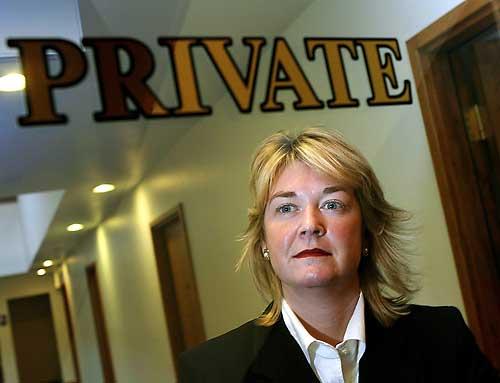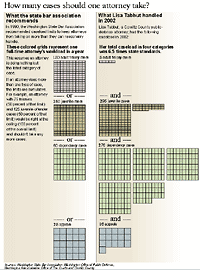 |
 |
 |
|
|
Tuesday, April 6, 2004 Frustrated attorney: 'You just can't help people' By Ken Armstrong and Justin Mayo Dependency cases: 276. One lawyer pitted against the combined forces of two state agencies, Tabbut defended parents fighting to keep their children in the face of neglect or abuse allegations. She scrambled to interview doctors, teachers and relatives in proceedings that can consume more time than defending an accused felon. Juvenile-offender cases: 295. Defending children and teenagers threatened with being locked up, Tabbut needed to grasp the evidence and appreciate her clients' backgrounds and needs. She was, in the words of one report on Juvenile Court, "society's link to children who might otherwise be lost." Criminal appeals: 16. Tabbut read trial transcripts hundreds of pages long, hunting for questions, arguments or rulings that violated the boundaries of a fair trial. Then she researched legal issues, wrote briefs and sometimes appeared for oral argument.
What is too much?
In 2002, Lisa Tabbut's caseload was 6½ times the accepted standard. The dependency cases alone demanded more than she could give. "It is so much," Tabbut says. "Frankly, it's malpractice per se. It's insane. You just can't help people when you're dealing with numbers like that." Tabbut's dilemma is repeated again and again, in courts throughout Washington — and America — as public defenders labor to keep up with stunning caseloads. "It's a huge concern, all over the state," says Cowlitz County Superior Court Judge Stephen Warning. "This is an ongoing, great big problem." In March of last year, Tabbut dropped her Juvenile Court contract — a fixed-fee contract that placed no cap on the number of dependency and juvenile-offender cases assigned to her. "Enough is enough," she says. Her job had become legal triage: "You decide who you can help and who's not going to get help. That's a terrible admission." Tabbut's Juvenile Court contract paid her approximately $86,000 a year. That may sound like good money, but in King County, where public-defense caseloads are controlled, the same amount of work would have been shouldered by two to three full-time attorneys. Looked at another way, Tabbut received the equivalent of $150 per case.
UNPOPULAR CAUSE Four decades ago, U.S. Attorney General Robert Kennedy said: "The poor man charged with crime has no lobby. Ensuring fairness and equal treatment in criminal trials is the responsibility of us all." But ensuring equal treatment — often for accused drug dealers, rapists, murderers and abusive parents — is costly and not always popular. "It's tough to go into the Legislature and say people who are accused of crimes, or people who are alleged to have done awful things to their children, need your help," Warning says. "We can't exactly do a telethon for them." Since the 1970s, legislative committees and bar groups have decried caseloads so excessive they undermine public defense. Those warnings have resulted in little more than one impotent state law, passed 15 years ago, which most counties have simply ignored. And because the state doesn't help pay for indigent defense at the trial level, except in a handful of cases, counties and cities must foot the bill alone. Many have embraced the type of fixed-fee contract at the root of Tabbut's struggles. Court records and other documents reveal that, across Washington, hundreds of public defenders carry caseloads that eclipse recommended limits. The same year Tabbut labored under a crushing caseload in southwestern Washington's Cowlitz County, a public defender in coastal Grays Harbor County carried this workload: 450 misdemeanor cases (50 percent above the recommended ceiling); 266 juvenile-offender cases; 21 adult felonies — and a private practice. "I haven't had a day off in probably three or four years now, quite honestly," the attorney, Kyle Imler, says. "Every day I'm in court somewhere. Then I meet with clients on the weekends, or in the evenings, or at the jail — whenever I get the chance."
LAWYER ... OR JUDGE?
In the 1963 ruling Gideon v. Wainwright, the U.S. Supreme Court said every defendant facing the threat of prison is entitled to an attorney, regardless of means. Ever since, states have struggled to uphold that promise. In Texas, judges repeatedly appointed an attorney infamous for falling asleep in court. In Georgia, a lawyer with public-defense contracts in five counties was fired after saying he assumes his clients are guilty ("It would be a grave error to assume innocence"); that defense attorneys should work as a team with judges and prosecutors ("It's time we put the maverick concept of counsel to rest"); and that he regretted missing family time while interviewing clients "sorry as the day is long." In Illinois, disciplinary officials suspended an attorney for nine months, citing incompetence and dishonesty. Ten days after his license was reinstated, the attorney was appointed to defend a man's life. His client was convicted and sentenced to death. Washington state can add its own bizarre tale. In Toppenish, a small town in Yakima County, Santos Rivas was charged in 1999 with a half-dozen misdemeanors, including disorderly conduct and possession of drug paraphernalia. Rivas wanted to talk to his court-appointed attorney before trial but couldn't reach him. About a month after he was charged, Rivas went to court. There, he discovered that his public defender was now his judge. The judge, Steve Michels, "essentially talked Rivas into firing him as his attorney and pleading guilty to all the charges," the Washington Supreme Court would later write. Michels sentenced Rivas to 540 days in jail, with all but 12 days suspended, and fined him more than $2,000. This wasn't the only time Michels served as both public defender and substitute judge in Toppenish Municipal Court.
|
|
||||||||||||
seattletimes.com home
Home delivery
| Contact us
| Search archive
| Site map
| Low-graphic
NWclassifieds
| NWsource
| Advertising info
| The Seattle Times Company

